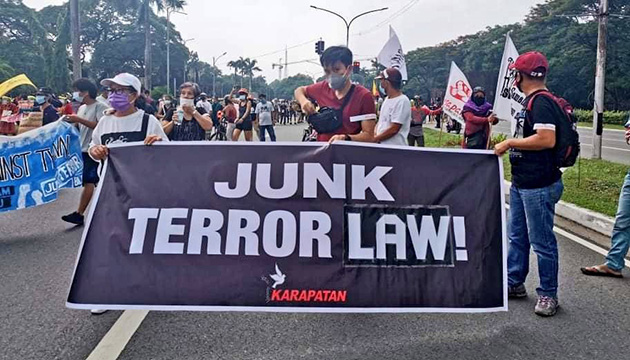Why are a significant number of Filipinos terrified about the anti-terrorism law? What is so terrifying about this law?
And why was the law passed despite the strong opposition of various groups?
The Anti-Terrorism Act of 2020, Republic Act No. 11479, intends to prevent, prohibit, and penalize terrorism in the Philippines. The law signed by President Duterte on July 3, 2020 is, supposedly, an effective “measure that seeks to give the country more teeth to curb terror threats and acts.”
Under this law, a terrorism suspect could be arrested without a warrant of arrest, detained for 14 days without charge, (a period that can be extended to 24 days), under surveillance for 90 days and given severe punishment. The law was signed by the president amid intense opposition from trade unions, national and international civil societies, several business associations and business executives. These various groups, including some lawmakers have raised concerns that the bill could worsen human rights abuses that are protected by the Constitution. Some of these groups have already raised the issues to the Supreme Court. The Court has scheduled oral arguments on the third week of September to 31 petitions filed against this law.
Several leading business associations from finance and banking, tourism and technology to private education and other sectors, for example, stated that they oppose "in the strongest possible terms the enactment at this time of the Anti-Terrorism Act of 2020" because "current threats to national security are well addressed by existing laws and policies. For the international human rights watchdogs, the law will eliminate critical legal protections and permit government overreach against groups and individuals it labeled terrorists.
For its part, the Catholic Bishops’ Conference of the Philippines (CBCP) issued a pastoral letter calling for prayers amid the recent signing of the highly controversial Anti-Terrorism Act of 2020, saying the return of warrantless detention is reminiscent of the arrest, search and seizure orders during martial law under Marcos. The CBCP added that the return of warrantless detention through the ATL might eventually lead to the fall of democracy and the rise of a dictatorial regime.
The CBCP further commented that it is “still in disbelief” on how the law was fast-tracked and approved in Congress while the country was focused on the coronavirus pandemic. It is dismayed that the lawmakers did not seem to care that many of the people they are representing were against it.
The religious group commented that “the dissenting voices were strong but they remained unheeded.” None of the serious concerns that they expressed about this legislative measure seemed to be of any consequence to legislators who supported the ATL. The political pressure from above seemed to weigh more heavily on them than the voices from below. It only made more evident “the blurring of lines between legislative and the executive branches of our government.”
Furthermore, the CBCP sounded the alarm for concern, citing examples such as those involved in social advocacies who had been accused of being communists, as well as bishops and priests who were “falsely charged” by the Philippine National Police with sedition and inciting to sedition, Senator Leila De Lima who remains in jail because of “trumped-up charges,” media personalities harassed with criminal charges, and recently the shutdown of ABS-CBN.
For now, everything hangs on the balance until the Supreme Court makes a final ruling. If the Court does not see anything unlawful about the law, would those in the opposition just suffer in silence in the meantime and hope that when a new set of rulers is elected in 2022, the ATL will eventually be rescinded? These next two years will be a very long wait, indeed.













